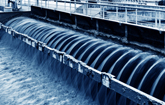COLLEGE PARK, Md., March 22, 2016 /PRNewswire-USNewswire/ -- As the planet experiences record heat and California suffers from an historic drought, the clean water that we need to safely and sustainably grow food crops is in short supply. In the face of climate change, finding alternative sources of water to grow food that is safe to eat has become an urgent national priority.
A multidisciplinary team, led by Dr. Amy R. Sapkota at the University of Maryland School of Public Health, is dedicating itself to developing innovative, safe and sustainable ways to irrigate food crops in variable climates. With a $10 million grant from the USDA National Institute of Food and Agriculture, awarded over a four-year period, the "CONSERVE" Center of Excellence links experts from the Mid-Atlantic and Southwest to identify the best nontraditional water sources and new water treatment technologies that farmers can safely use on food crops without compromising public health. The Center's focus will be on developing water reuse solutions to safely irrigate vegetable and fruit crops that are generally consumed raw, which therefore require the highest quality, contaminant-free water during the irrigation process.
"We are running out of water in our key food production regions," Dr. Sapkota, an environmental microbiologist, says. "We need to act now to figure out how to shift water usage patterns and successfully reuse water to sustainably and safely grow our food."
Revolutionizing how we use water to sustainably produce food while protecting public health requires the collaboration of many experts from around the nation. The CONSERVE (COordinating Nontraditional Sustainable watER Use in Variable climatEs) team includes bioscientists, engineers, economists, social-behavioral scientists, law and policy experts, agricultural extension specialists, educational media developers, computer scientists, and public health experts.
"Our goal is to develop water reuse solutions that will work both in Southwest states that are already in a water shortage crisis and in Mid-Atlantic states that can work more proactively to reduce our reliance on groundwater supplies for agriculture," Dr. Sapkota explains. "The water resource problems that CONSERVE will address in these key regions are exceptional issues that are critical to food safety and security, environmental sustainability and climate adaptation."
CONSERVE will be centered at the University of Maryland, College Park in the School of Public Health's Maryland Institute for Applied Environmental Health and include experts in UMD's College of Agriculture and Natural Resources, College of Computer, Mathematical and Natural Sciences, A. James Clark School of Engineering, SESYNC (National Socio-Environmental Synthesis Center) and a Maryland-based bioinformatics company, Cosmos ID. The team also includes key experts from the University of Maryland, Baltimore, School of Medicine and the Francis King Carey School of Law; the University of Maryland Eastern Shore; the University of Delaware; the University of Arizona; New Mexico State University; the US Department of Agriculture, Agricultural Research Service (USDA ARS); and the Arava Institute for Environmental Studies in Israel.
"The CONSERVE team brings together the broad collaborative expertise with which we must approach the greatest global challenges of our day," says UMD Vice President and Chief Research Officer Patrick O'Shea. "We look forward to learning from our colleagues across disciplines and institutions, and together creating innovative solutions for clean water."
The first stage of the Center's work is to identify, map and characterize alternative sources of water that could be reused for irrigation. The CONSERVE team members from the University of Maryland College Park, the University of Maryland Eastern Shore, the University of Delaware, the University of Arizona and USDA ARS will evaluate the microbial, physical and chemical constituents of reused water to understand what is required to make the water acceptable and safe for irrigation. This information will be used to develop and refine next generation water treatment technologies that will be used on farms to enable safe water reuse for food crop irrigation.
Another key scope of work, to be led by team members at the University of Delaware, is to study consumer behavior and gauge the acceptability of produce grown with nontraditional sources of water. Law and policy experts at the University of Maryland Francis King Carey School of Law in Baltimore will examine existing regulations around water reuse and make policy recommendations on how to safely advance water reuse on farms nationwide. CONSERVE extension specialists will train farmers to implement these systems on their farms and address specific needs.
The project also will have a significant educational component that includes the development of curricula for university classrooms and K-12 educators on water reuse, food safety, food production and environmental sustainability. Experts in "active learning" education and game development at New Mexico State University and the University of Delaware will create open source interactive modules for use in classrooms across the country. Project funds will support CONSERVE scholars—graduate and undergraduate students participating in internships and research experiences at CONSERVE's partnering institutions. Support will focus on training underrepresented students with the goal of diversifying and inspiring the next generation of water reuse leaders.
"Over time, implementing water reuse solutions to grow our food could dramatically shift the nature of farming," Dr. Sapkota says. "We want to be able to both feed people and protect public health. The on-farm water treatment technologies that we will be implementing have the potential to enable this, even as groundwater supplies dwindle in our nation's historically most productive agricultural regions."
The USDA announced the first year of its plan to help communities improve water resources, including funding for the CONSERVE project, on World Water Day, March 22, 2016.
Logo - http://photos.prnewswire.com/prnh/20130808/DC61542LOGO
SOURCE University of Maryland
WANT YOUR COMPANY'S NEWS FEATURED ON PRNEWSWIRE.COM?
Newsrooms &
Influencers
Digital Media
Outlets
Journalists
Opted In





Share this article